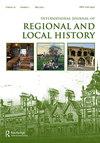Reciprocity and Political Authority: An Early State in South India
Q2 Arts and Humanities
International Journal of Regional and Local History
Pub Date : 2022-07-03
DOI:10.1080/20514530.2022.2131320
引用次数: 0
Abstract
ABSTRACT The Kadambas of Goa of south India emerged as a notable ruling power in Goa in the tenth century CE. This article discusses the nature of the interaction between the rulers and the ruled, utilising the early state theory of Henri J.M. Claessen. To achieve political and social authority, the kings of this early state employed diverse strategies. Some of these schemes involved elaborating a genealogy and entering into matrimonial alliances with the dominant powers of the region. But reciprocity and distribution of power also played an important role in achieving legitimacy for the rulers. The creation of brahmana settlements resulted in agrarian expansion and the establishment of the puranic order, which went a long way in achieving legitimacy for the ruling class, allowing the temporal and spiritual authorities to interact with each other.互惠与政治权威:印度南部的一个早期国家
公元10世纪,印度南部果阿邦的卡达姆巴(Kadambas)成为果阿邦一个引人注目的统治力量。本文运用亨利·克莱森的早期国家理论,探讨了统治者与被统治者之间互动的本质。为了获得政治和社会权威,这个早期国家的国王采用了多种策略。其中一些计划涉及详细的家谱,并与该地区的主导力量缔结婚姻联盟。但是,互惠和权力分配在统治者获得合法性的过程中也发挥了重要作用。婆罗门定居点的建立导致了土地扩张和puranic秩序的建立,这在统治阶级获得合法性方面走了很长一段路,允许世俗和精神当局彼此互动。
本文章由计算机程序翻译,如有差异,请以英文原文为准。
求助全文
约1分钟内获得全文
求助全文
来源期刊

International Journal of Regional and Local History
Arts and Humanities-History
CiteScore
0.30
自引率
0.00%
发文量
10
期刊介绍:
The International Journal of Regional and Local History aims to publish high-quality academic articles which address the history of regions and localities in the medieval, early-modern and modern eras. Regional and local are defined in broad terms, encouraging their examination in both urban and rural contexts, and as administrative, cultural and geographical entities. Regional histories may transcend both local and national boundaries, and offer a means of interrogating the temporality of such structures. Such histories might broaden understandings arrived at through a national focus or help develop agendas for future exploration. The subject matter of regional and local histories invites a number of methodological approaches including oral history, comparative history, cultural history and history from below. We welcome contributions situated in these methodological frameworks but are also keen to elicit inter-disciplinary work which seeks to understand the history of regions or localities through the methodologies of geography, sociology or cultural studies. The journal also publishes book reviews and review articles on themes relating to regional or local history.
 求助内容:
求助内容: 应助结果提醒方式:
应助结果提醒方式:


